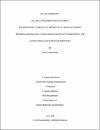Job Insecurity Climate as a Mediator of the Relationship between Job insecurity and Each of Affective Commitment, Job Satisfaction, and Turnover Intention
Abstract
The matter of job insecurity has been increasingly attracting many researchers in light of the evolvement of the work environment, economic crises, and raised competition among organizations. Numerous studies have explored its undesirable impacts on work outcomes. Job insecurity climate has been recently recognized as an important factor to be considered in assessing perceived job insecurity. It represents how an employee senses the job insecurity climate at his/her organization.
The objective of this research is to investigate the position of job insecurity climate as a mediator on the relation between individual job insecurity from one side and each of employees’ affective commitment, job satisfaction, and the intent to quit from the other side. Additionally, this study tries to validate the findings of previous research on the impact of job insecurity on job insecurity climate and on related job outcomes. The research targeted permanent contract employees from the construction industry of Qatar, where a link to an online survey was sent to 350 coopted professionals through a private message on their LinkedIn accounts or to their WhatsApp numbers. The total number of respondents was 120 employees with a response rate of 34%, the completeness rate was 86.7%. In total, seven hypotheses were generated and tested via SPSS/PASW software using reliability analysis, correlation and regression tests.
The empirical study revealed that job insecurity has a significant impact on job insecurity climate. Moreover job insecurity climate mediates the impact of job insecurity on affective commitment, while no significance was found on the contribution of job insecurity climate as a mediator on the impact of job insecurity on intentions to quit. The study also reported that the effect of job insecurity on job satisfaction was not significant.
The implications of the findings are also discussed in the report along with a set of recommendations for both researchers and practitioners.
DOI/handle
http://hdl.handle.net/10576/11449Collections
- Business Administration [120 items ]


